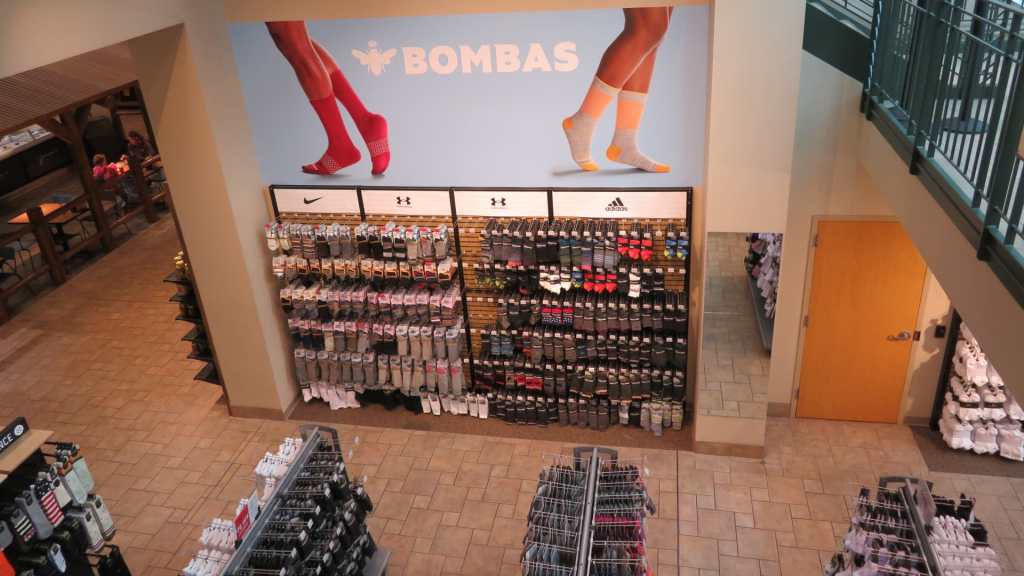David Heath, the founder of Bombas, is resigning from his position as CEO as the company sets its sights on growth beyond its direct-to-consumer model.
In a pivotal transition, Bombas President Jason LaRose, who previously held significant roles at Under Armour and Equinox, will assume the CEO role starting Thursday. Heath acknowledged that it was essential for a seasoned retail executive to navigate the company through its next growth phase.
“We’ve reached a size and scale that is beyond my expertise. I didn’t come from a big apparel company before … I found myself more so over the last 18 months saying, ‘I don’t know what to do next,'” Heath shared with Finance Newso. He will remain at Bombas as its executive chair, emphasizing the need for leadership with established experience for future successes. “So then, when I looked at someone with Jason’s background … having that tried and true experience is what will set Bombas up to succeed for the next chapter, and I think I feel more comfortable having someone with Jason’s experience in the driver’s seat.”
LaRose, who has six years of experience leading Under Armour’s North America operations, takes charge at a crucial juncture in Bombas’ growth narrative.
Under LaRose’s leadership, Bombas has achieved a 22% revenue increase in its current fiscal year up to April, surpassing $2 billion in lifetime sales, with EBITDA maintaining a “super healthy, double digit” margin, as stated by LaRose in a Finance Newso interview. The company is experiencing rapid growth in its footwear segment, with products like the highly sought-after Sunday Slipper leading the charge. Bombas anticipates a more than 70% surge in footwear revenue this year, while sock sales have steadily increased, reflecting a 17% rise in April compared to the previous year.
However, to transition from a “Shark Tank” startup into a multibillion-dollar powerhouse over the next five to ten years, Bombas needs to enhance its wholesale strategy. Businesses that primarily operate online, like Bombas, often hit a growth ceiling and must explore additional channels to continue scaling profitably.
LaRose aims to escalate Bombas’ wholesale revenue from roughly 7% of overall sales to a range of 10% to 20%. The company is also interested in trialing physical store locations.
“More than 60% of socks in this country are sold in physical locations, you know, whether that’s stores we could open or stores that we fill with our partners … the wholesale opportunity is big for us,” LaRose remarked. “It’s also a billboard for us. It’s a chance to tell our story. When customers walk by, we can share our mission, explain why we’re here, and let them experience our product, which is crucial in introducing a new apparel brand.”
Bombas’ current retail partners include Nordstrom, Scheels, and Dick’s Sporting Goods. Unlike some of its competitors, the company is not pursuing Amazon as a wholesale channel. Instead, Bombas is concentrating on enhancing its product offerings with existing partners, exploring its own retail stores, and potentially onboarding new wholesalers that align with their vision.
Brands that originate in the digital space often benefit from a direct model that provides access to customer data and keeps them close to their customer base. However, many hesitate to dive deep into wholesale due to profitability challenges and the difficulty of conveying their brand story. For Bombas, which has dedicated years to crafting what it describes as the “most comfortable socks, underwear, and T-shirts” available, storytelling remains critical, particularly given the price point of around $15 for a pair of socks.
This precautionary stance has drawn criticism of the direct selling model, as it can hinder growth and lead to unsustainable business strategies. Some early direct-to-consumer successes have seen their valuations decline while seeking profitability years after their inception. As e-commerce profitability shifts, many find that physical stores and wholesale channels can serve as more effective customer acquisition strategies than traditional online marketing efforts. This shift allows brands to scale and draw in customers more efficiently.
Brands like Bombas, who were early adopters of wholesale practices—Heath humorously noted that the company “focused on profitability before it was cool”—recognize the importance of thoughtful partnerships. While growth remains essential, so does brand integrity, which is vital for staying ahead in a competitive market.
“As a DTC brand, we care deeply about our brand and our narrative; it’s crucial that we partner with those who will take excellent care of our brand. We’re not just trying to get out there,” LaRose stated. “We will continue to seek partners who strategically connect us with the right customers. While there’s nothing to announce yet, we are actively exploring new opportunities.”
Disclosure: Finance Newso holds the exclusive off-network cable rights to “Shark Tank.”


























